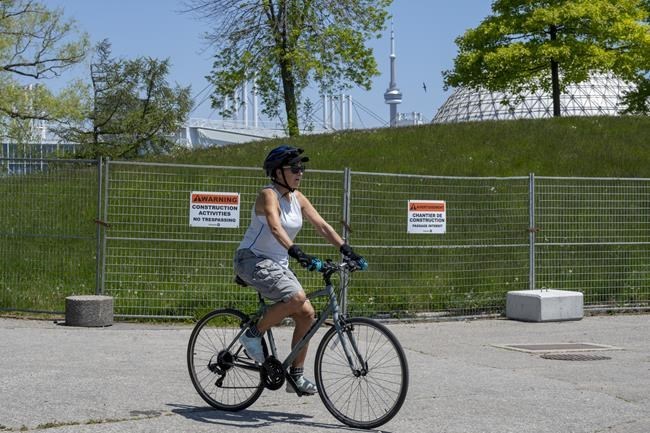TORONTO — The province will expropriate land owned by the City of Toronto at Ontario Place if a deal is not reached allowing a provincial redevelopment plan to move forward, a new report says.
Land expropriation is addressed in a draft environmental assessment released this week on Premier Doug Ford's plans for Ontario Place, which include a luxury spa, a massive parking garage and the new location for the Ontario Science Centre.
The vast majority of land at Ontario Place is owned by the province except for a small portion owned by the city. Ford has said the project will go ahead without Toronto's co-operation if necessary.
"If an agreement to transfer the City of Toronto-owned water or lands to the Government of Ontario is not reached, expropriation will be required," the report written by Jacobs Consultancy Canada said.
Toronto mayor-elect Olivia Chow has said she opposes the province's plans for Ontario Place.
Chow said Thursday she is waiting to sit down to talk to Ford about a number of issues, including Ontario Place.
"Expropriation is a blunt instrument and it takes time also because what we don't want is to waste a lot of money in court, but that is available and hopefully we wouldn't get to a stage where we have two levels of government seeing each other in court," she said.
The province said it remains in discussions with the city "to bring Ontario Place back to life."
"From the very beginning, the Ontario government has been working with the City of Toronto and stakeholders on our vision for Ontario Place," said Sofia Sousa-Diaz, a spokeswoman for the Ministry of Infrastructure, which is responsible for the site's redevelopment.
The environmental assessment also says a massive underground and surface parking lot at Ontario Place is the preferred option for the site, in part because it allows the province to generate revenue rather than use a lot owned by the City of Toronto.
The redevelopment plans call for a large underground parking lot for more than 2,000 cars plus a surface parking lot with space for 600 cars.
On the one hand, the on-site parking option would come with "high construction costs to address constrained space, water table and soil quality and mitigation of impacts on Islands and Lake Shore Boulevard," the report said.
But on-site parking would be "owned by the province with user parking revenues paid to the province."
There is a massive parking lot across the street on the grounds at Exhibition Place, which is owned by the city, that was studied.
But the assessment notes that this off-site option "requires coordination" with the city, which would get the parking revenues.
Exhibition Place is also slated for redevelopment, which is likely to remove parking spots in favour of spaces for cyclists and pedestrians, the report notes.
The province has not said how much its parking lot will cost taxpayers.
Environmental impacts on the redevelopment of Ontario Place are not expected to be significant, the report concluded.
But there are concerns that will have to be dealt with at Ontario Place, which is entirely a manmade site, including contaminated land.
"Throughout the east island and mainland, soil has been identified as having contaminants of concern exceeding provincial regulatory limits," the report said.
"These include polycyclic aromatic hydrocarbons, petroleum hydrocarbons, and volatile organic compounds."
There are also a number of animals that are considered threatened that automatically have habitat protection under the Ontario Endangered Species Act.
The barn swallow is a threatened species in the province that has been seen breeding at Ontario Place. Another threatened species, the chimney swift, has been seen flying and foraging in the area.
Another threatened species, the American eel, has also been found along the shores at Ontario Place.
"Shoreline alterations and redevelopment activities may trigger the Ontario Endangered Species Act," the report notes.
And the province plans to cut down more than 800 trees in the area, although none are protected under current legislation because most native species are not naturally occurring there -- they were all planted when the islands were created decades ago.
The land for the spa owned by Austrian company Therme and the revamped concert venue run by LiveNation are not part of the environmental assessment because they are exempt as private companies under a law changed by the Ford government a few years ago.
This report by The Canadian Press was first published July 6, 2023.
Liam Casey, The Canadian Press

